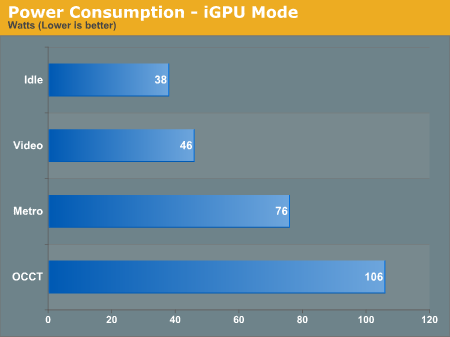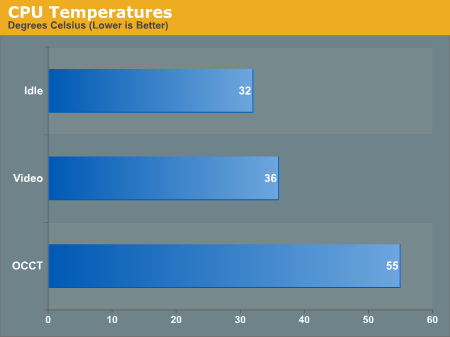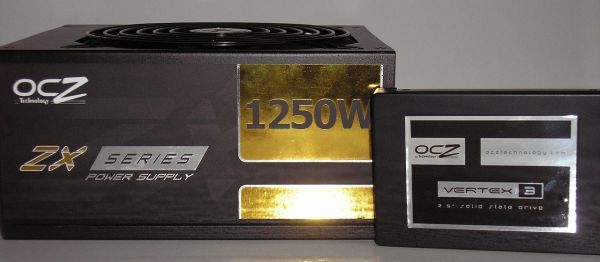Gigabyte Z68X-UD3H-B3 Review
by Brendan van Varik on July 11, 2011 7:01 AM EST- Posted in
- Gigabyte
- Motherboards
- Sandy Bridge
- Z68
Test Setup
| Processor |
Intel Core i5 2500K ES 4 cores, 4 threads, 6MB L3 |
| Motherboards | Gigabyte Z68X-UD3H-B3 ($170) |
| Cooling | Thermalright Ultra 120 eXtreme with one 120MM fan |
| Power Supply |
Silverstone 1000W Silver (Power Testing) OCZ ZX Series 1250w 80 PLUS Gold |
| Memory | Patriot Viper Extreme DDR3-2000MHz 9-11-9-27 2x4GB - 1.65v |
| Memory Settings | DDR3-1333MHz - 9-9-9-24 1T at 1.65v |
| Video Cards | XFX HD 5850 1GB |
| Video Drivers | Catalyst 10.12 |
| Hard Drive | OCZ Vertex 3 240GB |
| Optical Drive | Samsung SH-S223Q |
| Case | Dimastech Bench Table |
| Operating System | Windows 7 64-bit |
| SATA Testing |
OCZ Vertex 3 240GB Micron C300 |
| USB 2/3 Testing | Patriot 64GB SuperSonic USB 3.0 |
Before we go any further, I’d like to take the time to thank OCZ for making this review as well as future reviews possible – OCZ provided a ZX series 1250w Gold rated PSU (retails at $240) and a Vertex 3 240GB SSD (retails at $560).
Comparison to Previous Results
Where applicable, the results in this review are directly compared to the following chipsets and boards which we have reviewed previously:
Power Consumption
Power consumption was tested on the system as a whole with a wall meter connected to the power supply, while in a dual GPU configuration. This method allows us to compare the power management of the UEFI and the board to supply components with power under load, and includes typical PSU losses due to efficiency. These are the real world values that consumers may expect from a typical system (minus the monitor) using this motherboard.

As this is my first review for AnandTech, Ian hasn't run any tests using his OCZ 1250W power supply yet, making any tests he has previously done with an older power supply not comparable to this motherboard.
CPU Temperatures

In a similar situation, Ian and I have different cooling setups (he is using a H50, I'm using a TRUE) for now, so I cannot compare these results to others and draw justifiable conclusions.











70 Comments
View All Comments
versesuvius - Monday, July 11, 2011 - link
Use of plurals for a single entity derives from not knowing which part of that entity the speaker is talking about. It is very curious. I may be wrong but I cannot remember, "IBM have", "Apple have", "Asus have". They are all upstanding members of their trade and craft. But, while Gigabyte is good enough, there is something about it that prevents people from looking at it as a solid entity that deserves a singular reference. In fact, I would go as far as saying that the message is that the unpredictable collection known as Gigabyte has given us this, this time at this price. Gigabyte could as well have priced it $420. As if the pipeline is just cut off at random by a random part of that collection and a product shipped to the market. Not the case with Asus or IBM. Hence, IBM "has", Asus "has".Of course, with regards to the British the plural is a sign of respect. Remember, they are a monarchy, with hereditary parliament membership, and apparently very happy and proud of it. It is absurd to refer to a member of the house of lords in singular terms. Each is a well known clan. Oh, and well respected!!
Andypro - Monday, July 11, 2011 - link
I'm glad someone brought this up. Anandtech editors should edit articles to be consistent.The problem is that American English has a different rule than European English. The American English rule is the correct one. A well-edited scientific site like ArsTechnica recognizes this and edits all of its articles (notice that I used the singular possessive pronoun "its" there) to that end. Anand himself does a nice job with this since he's an American.
Some of the other American writers are being influenced by Wikipedia, British writers, and other sources of confusion. The fact is that number must agree throughout the entire sentence. Logically, the British rule can never accomplish this harmony of number because the corporate entity is always singular. Writers can easily avoid ambiguous constructs by making the subject more specific which helps convey meaning, eg., "Apple's engineers have" or "nVidia's marketing gurus are," etc.
byr - Monday, July 11, 2011 - link
Grammar can be an observance of and more than, rules. Style may be approached. Cautiously."I'm glad someone brought this up. Anandtech editors should edit articles to be consistent."
I'm glad someone brought this up. Anandtech editors should edit articles for consistency.
English writers have and are not considered a source of confusion with the English language any more than writers of other nationality's, Americans included.
Corporations and other entities can be personified perfectly well.
'Apple has pursued it's singular goal' is acceptable as the intention of one entity, further distinctions are made with relevant reference.
'Jobs has a plan for apple"
Two comments above
"Of course, with regards to the British the plural is a sign of respect. Remember, they are a monarchy, with hereditary parliament membership, and apparently very happy and proud of it. It is absurd to refer to a member of the house of lords in singular terms. Each is a well known clan. Oh, and well respected!!"
'The right honorable' is considered the appropriate honorific (they rarely are), it is singular and they, depending on who you ask, are sometimes respected.
British English is adequate until you reach then end of it, then you can use American English if you must. ;)
irreverence - Thursday, July 14, 2011 - link
Byr,I have literally no idea what you were trying to say there. Reading your post made me feel like I had been drugged.
cjs150 - Tuesday, July 12, 2011 - link
"The problem is that American English has a different rule than European English. The American English rule is the correct one. "Look buddy, American English is not correct. Americans cannot spell and if, like me, you have ever had to read a document drafted by an American lawyer, punctuation is not an American strong point but verbal diarrhoea is.
I would say that the only correct form of English is what you call British English, but fact is that English is very flexible. As long as Anandtech are consistent that is fine.
Anyway back to the board. Fan control. Do Gigabyte own shares in one of those companies who make separate fan controller? Because that is the only excuse for such a pitiful on board control
MadMinstrel - Wednesday, July 13, 2011 - link
It's funny how you can determine with such certainty that one rule is correct and another is not. Language is not based in math, it is an arbitrary set of rules driven by speaker inertia. If both variants of the rule set are equivalent in functionality, neither can be considered correct or even superior. In "Gigabyte has/have released a new motherboard", "Gigabyte" could mean either "the Gigabyte corporation" or "the people at Gigabyte". I could argue that the singular variant is illogical because a corporation, an abstract entity, cannot perform any action other than perhaps come into existence. Or I could argue that the plural variant is wrong because fewer people use it. This, of course, would be pointless.marc1000 - Monday, July 11, 2011 - link
nice board, but without speed control on the sys fans, it is less interesting than other options... also very few sata ports for a new product. Gyigabyte is really keeping it "safe and cheap".EnzoFX - Monday, July 11, 2011 - link
One of the great things about UEFI is the faster boot times. Does this hybrid BIOS allow the same? If it's merely a question of cosmetics, then the classic BIOS look would not bother me.paul878 - Monday, July 11, 2011 - link
How was the cpu temperature measured?cyberguyz - Monday, July 11, 2011 - link
... and most motherboard manufacturers are guilty of this, is the fact that they stick the PCIe-1x slots directly below the PCIe-16x slot and leave the outdated PCI slots wide open down at the bottom of the board. It really burns me that these guys don't think of the fact that most new add-in cards are being produced to use in the more modern PCIe-1x and PCIe-4x slots. An example is that I have a PCIe sound card, a high speed network card and a raid controller. Because I also have an Asus GTX 570 Cu II video card (eats 3 slots), I can't use any more than two of these (If I don't mind losing 8x lanes to by x16 card and don't mind snuggling up the shortest one of these PCIe cards really close to the backside of that really HOT video card). Yet I have 2 ncie cool PCI slots sitting out there in the open airstream with no hot components anywhere near them. Video cards are challenging enough to cool without crowding cards within a couple millimeters of them.In order to use all my PCI devices I have to find one of the very few and more expensive motherboards that provide nothing but PCIe slots (No PCI bridge = more expensive - where is the logic in that?)
Grrrr! I have no gripe in mobo makers including a couple PCI slots. There are users out there that will still use them for a few years to come yet. They just need to think that as we progress in technology that these older slots are being abandoned by users in favor of the more modern PCIe versions of their add in cards.